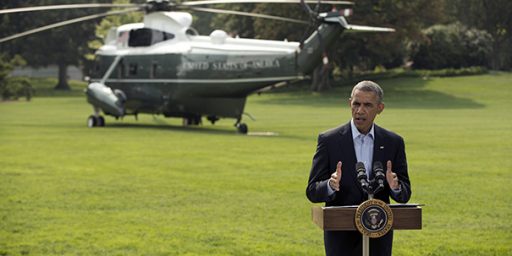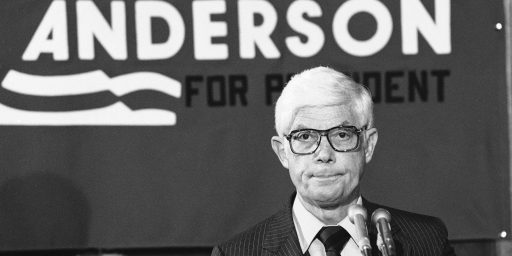When Should Generals Resign in Protest?
Elected representatives, not soldiers, make policy. But there are times when generals should make a stand.
Guesting at Tom Ricks’ Best Defense blog, retired Marine Colonel Gary Anderson suggests that the Chairman of the Joint Chiefs of Staff, Army General Martin Dempsey, ought to threaten to resign his post because “the Obama strategy for dealing with the self-proclaimed Islamic State is doomed to fail as currently structured.” Given that Dempsey’s public comments have hinted that he agrees with Anderson’s strategic assessment, “The threat of a resignation itself might cause the president to reconsider his ill-advised action in taking American troops in a ground role off the table.” Further, Anderson argues, “Rather than be remembered as the failed implementer of a strategy that he knew to be fatally flawed, Dempsey would be an example to generations of future West Point cadets as a soldier who put honor and professionalism above career concerns.”
While I fully concur with Anderson that the president’s plan, as currently outlined, will fail to achieve its ostensible objective to “degrade, and ultimately destroy, ISIL” and believe Dempsey agrees as well, that’s not grounds to offer his resignation.
The people’s elected representatives, not its generals, set American national security policy. Dempsey’s role is to offer his best military advice to the president and Congress. It’s their responsibility to weigh competing risks and decide the resources to allocate. The president has decided, and by their silence Congress has acquiesced to his decision, that the threat posed by the Islamic State is high enough to demand military action but not so high as to risk American ground troops. Instead, he’s hoping that regional forces will miraculously serve as the ground combat element.
As it happens, the president and the American people are on the same sheet of music. In the latest polling, 73% support air strikes against ISIS while only 38% support sending in American ground troops. While I think they’re wrong, some 62% are at least somewhat confident that the plan will succeed.
While Dempsey has given every indication that he, too, is skeptical that we’ll achieve the president’s objectives without an American ground presence, I haven’t the foggiest idea whether he believes the objective is worth risking the lives American ground forces. Even if he does, however, he’s simply being overruled by his commander-in-chief on a policy decision.
There are occasions when officers should at least strongly considering resigning over principle when their recommendations are overruled. Most obviously, these occur when they believe following their orders will greatly endanger the nation, waste the lives of the troops under their charge, or believe the orders to be illegal or immoral.
The case for resignation would be much stronger if the situation were reversed. That is, if the president were ordering a large contingent of American ground forces off to war and Dempsey strongly believed that the risks would be in vain, then Anderson’s suggestion of “slap[ping] his four stars on the table and tell[ing] the president to find somebody else to pitch the next inning” would be much more compelling.
Likewise, if Dempsey believed that failing to immediately send American ground troops in to defeat ISIS would put American citizens in grave jeopardy, then a grand gesture would be warranted. But I know no one credible who’s making that argument and, certainly, Dempsey has given no hint that he thinks that.
Finally, it’s possible to construct an argument that, given ISIS’ nesting among a noncombatant population, that attacking them via a massive air campaign is in violation of the laws of war. But, again, I have no reason to think Dempsey believes that.
Absent those motivations, threatening to resign in hopes of forcing the president’s hand or actually resigning to take the case public would stand the role of the general on its head, signaling that their policy preferences, not those of the elected commander-in-chief, should prevail.
Nor would Dempsey’s resignation somehow signal putting ” honor and professionalism above career concerns.” He is, after all, at the pinnacle of his profession; there is no higher military post to which to aspire. Nor would he be putting anything at risk. He’s a four-star general with forty years of service; he’s eligible to retire at that grade and receive 100% of his base pay for life.
My guess is that Dempsey gave little or no serious consideration to handing in his stars, whatever his disagreements over the policy he’s being directed to help implement. Instead, he’s going to work every day giving his best military advice to the president and doing everything he can to shape the decisions to best serve the national security interests of the nation and implement the commander-in-chiefs policy in the most effective way possible while minimizing the risks to the men in women in our armed services. He can’t do any of that from the retired list.







Resigning over this disagreement, if it even exists, would be stupid because contrary to the flailing of the media ISIS just isn’t a major threat to the US or it’s allies.
It would be like me quitting a job to protest the carpet that was installed in reception.
I’m glad you posted on this subject, James. I was going to do it myself but it’s outside my comfort zone.
Generals are professionals like doctors or lawyers. That means they have ethical obligations that, say, used car salesmen don’t. Which in turn implies there are some conditions under which they should resign their commissions. However, it’s a matter of degree.
In all likelihood general officers like their jobs so it’s understandable they would hold on to them as long as they can, convincing themselves they are fulfilling their professional obligations by continuing to advise privately. But, as I say, it’s a matter of degree. Over the last forty years I strongly suspect there have been many occasions in which more of our general officers should have resigned as a matter of principle and the public wouild have been better-served by that.
Good piece James. I was an officer working for The Defense Intelligence Agency in Europe in the late 60’s and early 70’s. I made no secret of my opposition to the Vietnam debacle and I was not alone. I was shocked when my superior officer said “it was a crappy war but the only war we had.” We all took some heat for our positions on Vietnam but we did our job in Europe so for the most part were left alone.
I agree with you that Dempsy should remain where he is because there he has a chance of influencing the civilian policy makers. I also agree with Dempsy that the current policy is a joke that will accomplish little if anything – I felt the same way about Vietnam. Civilian policy makers are politicians and driven by politics – perhaps one of the drawbacks to our system of government. Outside of his position as Chairman of the Joint Chief of Staff Dempsy can have zero influence and only rattle cages. Should he resign he is really no different than the politicians he disagrees with.
But does Anderson have a point, simply misapplied in this case? It’s a matter of degree — there are some strategic missteps that would be so incredibly bad, like, say, invading and destabilizing a pariah state that had been successfully contained for years, that resignation would be warranted as a matter of professionalism and morality? So he’s obligated to give advice, not to overrule the President through threat of resignation, until the danger from the President’s decisionmaking reaches some critical level of “bad ideaness” that resignation as a political signal is warranted? One has to think that through to square it with notions of duty and oath, but I guess you can get there from here.
@Ron Beasley: “Civilian policy makers are politicians and driven by politics – perhaps one of the drawbacks to our system of government.”
I disagree strongly. If Americans are going to kill and be killed in a foreign war, the decisions should be made by the people acting through their elected government rather than by the professional military.
General, who? Go ahead and resign, who cares? No one is irreplaceable.
But if you are really going to make a statement…if you are really principled…then waive your fat a$$ pension.
Yeah…that’s what I thought.
@Ron Beasley:
What it won’t accomplish is killing 4000 troops, spending $2T, and empowering Iran in the process.
What it has accomplished is getting regional players in the game.
I don’t expect miracles.
And I don’t expect stupidity.
Oath of Enlistment – http://www.army.mil/values/oath.html
So, from what I see here… the concept of resigning over a disagreement would be a violation of their oath. (Especially as it seems that the disagreement is more a case of “how to act”, rather than “to act or not”.)
And, if this were a declared war, resigning could be a treasonous act, not supporting the president during wartime. (But it’s not a declared war – http://billmoyers.com/2014/09/11/obama-declared-war-on-isis-heres-what-you-need-to-know/ )
Finally… if I venture to guess from strictly personal perspective of a general, unless income from touring on the aggrieved conservative talk show circuit far outweighs the benefits of being a military general in good standing (especially all the potential consulting opportunities once retired)… ain’t gonna happen.
Col. (ret) Anderson’s plan is:
In other words, restart the Iraq war where we left off after the American people tired of it.
There seems to be a fair consensus on this thread that no one likes Obama’s stated plan, but no one has a better alternative. Dempsey is supposed to resign over this state of affairs? And demand what?
Col. Anderson is a new name to me, but so far he’s unimpressive.
James you and the generals are wrong. The minute you insert US troops the clock starts running. The IS will do all it an to capture someone and then we will be watching snuff films starring some hapless corporal. Obama is right, you guys are wrong. And I’ll go a step further: the IS is already screwed and we are already winning.
@michael reynolds:
They are basically maxed out…they hit their ceiling of Sunni support.
It’s not like they are going to enlist Shia’s or Kurds.
So now you have the three sects that Biden predicted way back when….and that Bush and Cheney were totally ignorant about when they invaded and occupied Iraq.
Not the first time in the last few weeks this has happened:
“Last week, Rep. Doug Lamborn (R-CO) made the startling claim that he (and, by implication, other Republicans) had been urging active duty military generals to resign if they disagreed with President Barack Obama’s policies.
“Let me reassure you on this,” Lamborn told a gathering of tea party voters in Colorado Springs on Sept. 23, according to the Colorado Independent. “A lot of us are talking to the generals behind the scenes, saying, ‘Hey, if you disagree with the policy that the White House has given you, let’s have a resignation.’”
I agree with Michael on the effectiveness of Obama’s strategy. He can’t not call for ISIS’s total destruction for domestic political reasons. But he knows it is better to contain and degrade them than to send in combat troops seeking their total destruction.
In record time Mr. Kerry and Mr.Obama have assembled a broad coalition. In record time that coalition – the US, France, UK, Denmark, Netherlands, Australia, Saudi Arabia, the UAE have all been involved in actual air operations. We will soon be adding Turkish ground forces, as well as pesh merga and the Baghdad Clown Car Brigade.
We’re actually doing very well.
The containment has begun. The IS is no longer taking significant territory and are in fact being pushed back. Their money is being cut off, their legitimacy is undercut, and their ability to recruit I predict will dramatically drop – it’s one thing to sign up for some triumphant march of rape and murder, it’s a whole other thing to volunteer to cower beneath American bombs.
So contra the hysterical narratives, and contra the Army generals who – surprise! – insist we need the airborne, we are doing quite well.
With ground troops we’d be out within a year. There would be prisoners, there would be more on the ground reporting, there would be more mournful stories. With just an air campaign we can go on as long as we need to. The story will fall off the front page within months.
James, you’re wrong. You too, Dave. And the generals.
@C. Clavin:
Yeah, that’s another guy who deserves some credit, Joe Biden. He called it a long time ago.
More importantly…Doug is currently struggling over how to spin 317,000 new jobs as a terrible thing.
@C. Clavin:
If unemployment fell to .001% Doug would tell us it was disappointing.
@Liberal Capitalist: Officers don’t take that oath. Specifically, they don’t swear to obey the orders of the president and senior officers.
@michael reynolds: As I’ve noted multiple times in other postings, I basically agree with Obama’s IS(*) strategy, disagreeing only on the nexus between what he says he’ll accomplish and what we’ll likely accomplish. I don’t think US ground combat forces are warranted. I don’t think we’ll defeat them with just airpower, either.
The military is a hierarchical bureaucracy. To get to the top in any such organization one has to go along to get along. I strongly doubt that there are generals who are capable of going outside the lines once they make it to the top after having spent an entire career inside the system.
I do not recall resignations during the bloody insanities of World War I; the generals then kept committing men to fruitless assaults on well defended positions.
The record of American generals who take their troops’ safety so seriously that they have resigned rather than risk them in non-purposeful combat is remarkably small. I can’t google up a single one. Which makes me somewhat more confirmed that the very last place we should look for that sort of principled conduct is the high ranks of the us military.
The very last place on earth.
A general should never threaten to resign in protest. He should serve or resign in protest. To twist a president’s arm with threats is not service.
I’d expect members of the armed forces to resign or disobey a superior officer if and only if they were given an order they regarded as illegal or immoral. I’m thinking now of situations like the ones faced by Colonel Picquart during the Dreyfus affair and by the Abu Ghraib jailers. Perhaps James or others with military experience could give us their thoughts on this.
@Stan: I sorta thought that I had!
I just took a look at the Fox New homepage, had to look very hard to find anything about ISIS. This is interesting, as just a few weeks ago screaming headlines were telling us ISIS is a threat to our very existence.
What’s changed? Well, now there is a fairly broad coalition in place and our forces are engaged with ISIS. Their guys are dying, and ours are not.
This was always about the right pursuing what seems to be their only objective – damage Obama, by any means possible. Well, that and tax cuts for billionaires…
@anjin-san: and not doing anything about the real existential threat, AGW, because saving the world might inconvenience some of those same billionaires.
@Pinky: Well said!
@Pinky:
Exactly right.
@James Joyner: From my civilian prospective, If an officer issues an order that’s moral in a military context and clearly legal, his subordinates should obey but should have the right to argue their case. Longstreet relaying Lee’s order for Pickett’s charge at the battle of Gettysburg is an example; if the history books are right, Longstreet protested the order, but obeyed in the end. I think that’s what you were talking about. I was talking about the right to resign or disobey in the case of an illegal or immoral order, torturing prisoners of war, for example, and I wondered what policy the American military follows in such cases.
As pointed out, it would be odd to resign because more troops weren’t being put in harms way when there is no direct, imminent threat to home soil. Even in the reverse, a resignation is a balance. If the officer feels the superiors are needlessly getting troops killed, they will do what it possible to limit that via their current command. If they resign, then the superior will put some other officer with less of a concern over the dangers in the position getting more men killed.
Resignations lower in the officer ranks can signal a lack of confidence in an intermediate commander and has some hope of prompting a replacement. But that presupposes that the superior officers aren’t in the same vein as the “poor” commander.
@James Joyner:
In the end, I think you know exactly why Obama spoke as he did , using the rhetoric of victory rather than containment. After all, this ain’t your first rodeo.
Had he spoken of containment, YOUR party would have crucified him for “adopting a defeatist strategy ” being a latter day Neville Chamberlain, “engaging in the politics of dhimmitude, ” being a crypto-Muslim appeaser, etc, etc. You know that, I know that, all the commenters know that, all the pundits know that. And it might have cost him the Senate.
General Dempsey probably knows this too, which is why he is still there and why he is avoiding any sign of pressuring the President
@anjin-san:
Hear hear.
@James Joyner:
You have said as much, but it seemed to me you were backing away from that a bit. I stand corrected.
@James Joyner:
Oath of Commissioned Officers – http://www.army.mil/values/officers.html
So: How did it change? Why is the president or senior officers not specifically stated in the officer’s version?
For some real insight, look at: http://www.history.army.mil/html/faq/oaths.html
Back in 1830, the officer’s oath had included:
To me, the simplifications would suggest that a modern day officer of the United States military should already know and respect the “order of officers”; and considering that the Constitution (that which they are swearing to uphold) places the military under the President’s command:
Article 2, section 2, clause 1:
… it would be a hard stretch for one to make a point that the specific omission of the president in the officers oath would specifically mean that officers are not responsible under him.
So: my first position still stands. In either oath, they are beholden to the President and must uphold the strategic direction as set.
However, I’m not a constitutional scholar / supreme court justice. I’ll leave that for others to debate.
My final comment: the disagreement is more a case of “how to act”, rather than “to act or not”… so I hardly see that as a point on which to choose to resign from a well respected General’s position.
HOWEVER… the real items that we SHOULD be discussing (as Moosebreath brought up): Should Rep. Doug Lamborn (R-CO) not be arrested for sedition?
That’s some f’ed up shit !
I’m having problems with the Foreign Policy link, so I hope I’m not misinterpreting anything. It seems like Joyner is mainly talking about reasons to resign, which is a reasonable thing to discuss. Anderson seems to be talking about something different.
I’ve always believe that if you don’t like a policy, you state your case against it to your superior. I’ve never served in the military, and I understand you might not always be able to do that, and you can’t always do that in the private sector either, but it’s an ideal. If your argument isn’t accepted, then you have a choice of doing everything you can to make the policy work, or leaving. You don’t undermine the policy, and you don’t huff and puff as if you’ve got a role beyond voicing your objection.
Now, if you’re part of a steering committee, or the policy is one that’s continually under review, there can be a place for steady opposition. If you’re on the implementation end, there probably isn’t. If you’re important enough that your decision to leave would alter the company’s thinking, then it’s worthwhile telling them that the path they’re suggesting would face the added difficulty of being implemented without your presence. But everyone’s replaceable, especially in the US military. McClellan was replaceable. MacArthur was replaceable. My guess is, Dempsey’s replaceable.
@C. Clavin: You must be reading different blog posts than me. He seemed to be very happy about the jobs report.
@Jeremy: Heh. Clavin reads posts. Thanks, Jeremy. (Can’t say I’m really surprised that Michael doesn’t read them either.)
@Ron Beasley: Fair enough. On the other hand, what is going to “succeed?” And what are we going to call “success?” We waded into the brier patch and now the question may not be “what is success?” but rather “how do we get out of this (at all)?”
I’m not a fan on this question of Reynolds and his notion of containment, but it may be the hand we’ve dealt ourselves.
@Pinky: Another factor that I discovered during my time in supervisory positions in business is that, when confronted with an “or else,” is almost always wiser to pick “else.” From the side of the ultimatum deliverer, don’t threaten, act if this is “the hill you’re willing to die on.”
@Stan: In theory, officers are not only allowed they’re legally obligated to refuse to obey illegal or immoral orders. Post Nuremberg, “I was just following orders” has not been a viable defense.
@JKB:You’re right in most cases. That’s my position here: Whether or not Dempsey thinks this particular policy wise, he’s professionally obligated to execute it to the best of his ability. But, as I’ve outlined in the post, there are instances where, if he feels the consequences of following the order are sufficiently dire for the country or the men and women in the armed forces, that resigning and going public makes sense. The “going public” option is not available to sitting officers.
@stonetools: It’s more than simple domestic politics but that’s part of it. Bush 41, whose foreign policy chops I respect much more, made a similar mistake in casting Saddam as Hitler in the first Gulf War. In overselling the case, which is expedient in selling it to the public and coalition partners, it becomes much harder to conduct the war rationally.
@michael reynolds: No worries. My guess is Dempsey is pretty much where I am on this. But my argument applies even if he agrees with Anderson.
@Liberal Capitalist: See my response to Stan above. Modern officers, especially generals and admirals, have a duty to the Constitution that goes beyond obeying orders. If the president’s orders were illegal or immoral—and I hasten to add that I don’t believe they are in this case—they have an obligation not to obey them.
As to attempts to get generals to resign in protest by Republican Members of Congress, I’m very uncomfortable to say the least. Again, I can see instances where that’s permissible. But I generally don’t like generals being used as political pawns or the suggestion that the opinions of military officers ought outweigh those of the commander-in-chief. It’s not sedition but it’s bad precedent.
@Pinky: The Chairman of the Joint Chiefs, in particular, has a statutory role as the chief military advisor to the president and Congress. I believe the position I’ve outlined in the OP is consistent with his role.
@Just ‘nutha’ ig’rant cracker: I don’t know that we have a better option. Doing nothing could be catastrophic and doing much more—that is, putting in significant American ground fighters—is politically untenable and could well actually exacerbate the situation.
James,
Well, my two cents is excellent description of a tricky concept. Diplomatic, concerning Col. Anderson’s begging the question of what Dempsey thinks, as well.